 W
WBa Jin was a Chinese author and political activist who wrote The Family in the 20th century.
 W
WBi Feiyu is a Chinese writer. His works are known for their complex portrayal of the "female psyche." He has won some of the highest literary awards in China. He also wrote the screenplay for Zhang Yimou's 1996 film Shanghai Triad.
 W
WCao Shui(simplified Chinese: 曹谁; traditional Chinese: 曹誰; pinyin: Cáo Shuí) born June 5, 1982, also known as Shawn Cao, courtesy name Yaou (Eurasian), pseudonym or hao Lord of Tower of Babel, is a Chinese poet, novelist, screenwriter and translator. He is one of the representative figures of Chinese Contemporary Literature. He leads the great poemism movement. In his Declaration of Great Poem, he aims to integrate sacred and secular cultures, oriental and occidental cultures, ancient and modern cultures in Chinese literature. His most notable works include the Epic of Eurasia, Secret of Heaven (trilogy), and King Peacock. His works are dedicated to rebuilding a republic in which the whole humanity can live in freedom, which he always described as Eurasia, the Top of the Tower of Babel or Kunlun Mountains. So far twenty books of Cao Shui have been published, including five poem collections, three essay collections, ten novels and one hundred episodes TV series and films. He is a member of China Writers' Association, China Film Association, and China Poetry Society. He is also the editor-in-chief of Great Poem and deputy editor-in-chief of Poetry Weekly. Currently he lives in Beijing as a professional writer and screenwriter.
 W
WCao Wenxuan is a Chinese novelist, best known for his works of children's literature. Cao is the vice president of Beijing Writers Association. He is also a professor and doctoral tutor at Peking University. His novels have been translated into English, Dutch, French, German, Italian, Japanese, Korean, and Serbian.
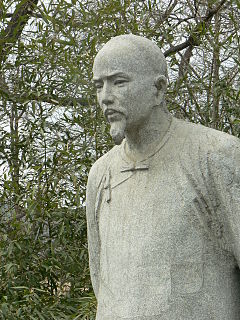 W
WCáo Xuěqín ; was a Chinese writer during the Qing dynasty. He is best known as the author of Dream of the Red Chamber, one of the Four Great Classical Novels of Chinese literature. His given name was Cáo Zhān (曹霑) and his courtesy name was Mèngruǎn.
 W
WChan Koonchung is a Chinese science-fiction writer who has previously lived in Hong Kong, Taiwan, and the United States. He currently lives in Beijing. He is the founder of Green Power (綠色力量), Green Garden Organic Farm (綠田園有機農場) and the Hong Kong Film Directors Association (香港電影導演會) among other organizations, and is currently on the international board of directors of Greenpeace. Previously, he worked as a reporter for the Hong Kong tabloid, The Star. In 1976 he co-founded City Magazine (號外) with Qiu Shiwen and Deng Xiaoyu and Hu Junyi. In the 1990s he worked as an overseas publisher for the mainland literary journal Dushu and Life, Reading, and Innovation Bookstore (生活读书新知三联书店). In 1991 he played the role of Professor Liu Yuebai in Yan Hao and Xu Ke's adaptation of Ah Cheng's 1984 novel, The Chess Master. His dystopian novel The Fat Years (2009) was published in English by Doubleday in 2011.
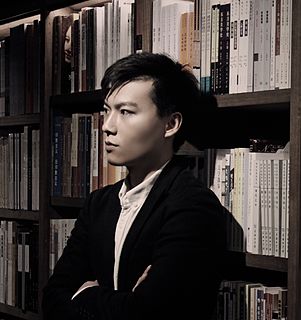 W
WChen Qiufan, also known as Stanley Chan, is a Chinese science fiction writer, columnist, and scriptwriter. His first novel was The Waste Tide, which "combines realism with allegory to present the hybridity of humans and machines". Chen Qiufan's short fiction works have won three Galaxy Awards for Chinese Science Fiction, twelve Nebula Awards for Science Fiction and Fantasy in Chinese. "The Fish of Lijiang" received the Best Short Form Award for the 2012 Science Fiction & Fantasy Translation Awards. His stories have been published in Fantasy & Science Fiction, MIT Technology Review, Clarkesworld, Year's Best SF, Interzone, and Lightspeed, as well as influential Chinese science fiction magazine Science Fiction World. His works have been translated into German, French, Finnish, Korean, Czech, Italian, Japanese and Polish and other languages.
 W
WWang Lin-du, better known by his pen name Chiang Kuei, was a Chinese novelist active in Taiwan.
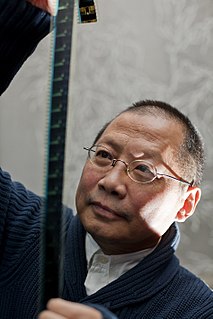 W
WDai Sijie is a Chinese–French author and filmmaker.
 W
WGao Xingjian is a Chinese émigré novelist, playwright, critic, painter, photographer, film director, and translator who in 2000 was awarded the Nobel Prize in Literature "for an oeuvre of universal validity, bitter insights and linguistic ingenuity." He is also a noted translator, screenwriter, stage director, and a celebrated painter. In 1998, Gao was granted French citizenship.
 W
WHan Shaogong is a Chinese novelist and fiction writer.
 W
WXuefei Jin is a Chinese-American poet and novelist using the pen name Ha Jin (哈金). Ha comes from his favorite city, Harbin. His poetry is associated with the Misty Poetry movement.
 W
WLouis Cha Leung-yung, better known by his pen name Jin Yong, pronounced "Gum Yoong" in Cantonese, was a Chinese wuxia novelist and essayist who co-founded the Hong Kong daily newspaper Ming Pao in 1959 and served as its first editor-in-chief. He was Hong Kong's most famous writer.
 W
WLin Yutang was a Chinese inventor, linguist, novelist, philosopher, and translator. His informal but polished style in both Chinese and English made him one of the most influential writers of his generation, and his compilations and translations of classic Chinese texts into English were bestsellers in the West.
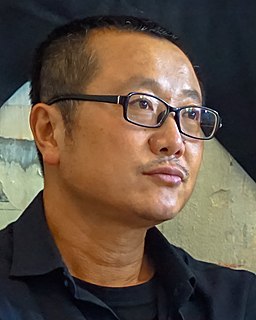 W
WLiu Cixin is a Chinese science fiction writer. He is a nine-time winner of the Galaxy Award, winner of the 2015 Hugo Award and the 2017 Locus Award as well as a nominee for the Nebula Award. In English translations of his works, his name is given in the form Cixin Liu.
 W
WLiu E, courtesy name Tieyun, was a Chinese writer, archaeologist and politician of the late Qing Dynasty.
 W
WLuo Ben, better known by his courtesy name Guanzhong, was a Chinese writer who lived during the Ming Dynasty. He was also known by his pseudonym Huhai Sanren. Luo was attributed with writing Romance of the Three Kingdoms and editing Water Margin, the first two of the Four Great Classical Novels of Chinese literature.
 W
WMa Jian is a Chinese-born British writer.
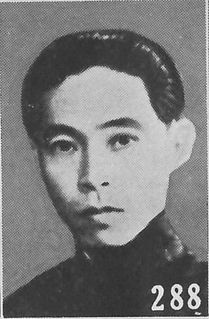 W
WShen Dehong, known by the pen name of Mao Dun, was a Chinese essayist, journalist, novelist, and playwright. A 20th-century Chinese novelist, cultural critic, and the Minister of Culture (1949–65), he is one of the most celebrated left-wing realist novelists of modern China. His most famous works are Ziye, a novel depicting life in cosmopolitan Shanghai, and Spring Silkworms. He also wrote many short stories.
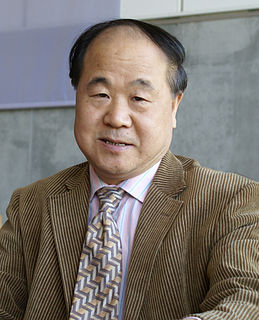 W
WGuan Moye, better known by the pen name Mo Yan, is a Chinese novelist and short story writer. Donald Morrison of U.S. news magazine TIME referred to him as "one of the most famous, oft-banned and widely pirated of all Chinese writers", and Jim Leach called him the Chinese answer to Franz Kafka or Joseph Heller.
 W
WNi Cong, courtesy name Yiming, better known by his pen name Ni Kuang, is a Hong Kong-American novelist and screenwriter. He has written over 300 Chinese-language wuxia and science fiction novels, and more than 400 film scripts.
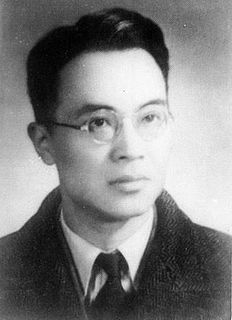 W
WQian Zhongshu, also transliterated as Ch'ien Chung-shu or Dzien Tsoong-su, was a renowned 20th century Chinese literary scholar and writer, known for his wit and erudition.
 W
WQu Bo was a Chinese novelist. His name was also translated as Chu Po. Qǔ (曲), the family name, has meanings of curve, melody and tune. Bō (波) stands for ripples and waves. His first book Tracks in the Snowy Forest (林海雪原) made him one of the most popular authors at the time.
 W
WRou Shi was a prominent left-wing Chinese writer and member of the May Fourth Movement. Executed on either 7 or 8 February 1931 by the Kuomintang government in Shanghai for his pro-Communist activities, he is considered one of the Five Martyrs of the League of Left-Wing Writers.
 W
WWang Lixiong is a Chinese writer and scholar, best known for his political prophecy fiction, Yellow Peril, and for his writings on Tibet and provocative analysis of China's western region of Xinjiang.
 W
WWang Meng is a Chinese writer who served as Minister of Culture from 1986 to 1989.
 W
WWang Wen-hsing was born in Fuzhou, Fujian, in 1939 and grew up in Taiwan. He obtained a BA in Foreign Languages and Literatures from National Taiwan University and an MFA in Creative Writing from the Iowa Writers' Workshop. He returned to NTU's Department of Foreign Languages and Literatures to teach, retiring in 2005 at the rank of Professor.
 W
WWong Shee Ping, 黃樹屏, also known as Wong Yau Kung 黃右公/黃又公, was a Chinese writer, newspaper editor, political activist and Christian preacher. Born in the county of Kaiping in the southern Chinese province of Guangdong, as a young man he moved to Melbourne, Australia, where his family had business interests. He was active in the Chinese-Australian community as a preacher and Kuomintang organiser, became editor of the Chinese Times newspaper, and wrote the first known novel by a Chinese-Australian author, The Poison of Polygamy (1909-1910). He returned to China in 1924, where he served in various posts in Sun Yatsen's government of the Republic of China.
 W
WWu Jianren, also known as Wu Woyao was a Chinese writer of the late Qing period. A native of Foshan, Guangdong province, he is known for several novels, namely Bizarre Happenings Eyewitnessed over Two Decades and The Sea of Regret. Wu Jianren published one of the earliest modern Chinese novel in the 19th century. He is a representative of modern Chinese novel for two reasons, time and his technique. The time he posted his modern Chinese novel is ahead Lu Xun at least one decade, and his technique about narrator and centralized character is ahead of other novels that written in the same time. Wu Jianren wrote the most articles in the group of writers who answered Liang Qichao's call. His novel 《二十年目睹之怪现状》(Bizarre Happenings Eyewitnessed over Two Decades) and 《九命奇冤》(strange grievance case of nine lives) has deeply affected modern Chinese novel.
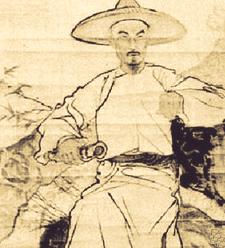 W
WWu Jingzi was a Chinese scholar and writer who was born in the city now known as Quanjiao, Anhui and who died in Yangzhou, Jiangsu. Wu Jingzi is the author of a famous satirical novel titled Rulin waishi or The Unofficial History of the Scholars.
 W
WXiao Ke was a general of the Chinese People's Liberation Army, former vice chairman of the CPPCC, as well as principal of the University of Military and Politics.
 W
WYan Lianke is a Chinese writer of novels and short stories, based in Beijing. His work is highly satirical, which has resulted in some of his most renowned works being banned in China. He has admitted to self-censorship while writing his stories in order to avoid censorship.
 W
WYao Xueyin was a Chinese novelist who was a member of China Writers Association. Yao was a member of the 5th, 6th, and 7th National Committee of the Chinese People's Political Consultative Conference. Yao used his fortune posthumously to institute the Yao Xueyin Historical Novel Prize (姚雪垠长篇历史小说奖).
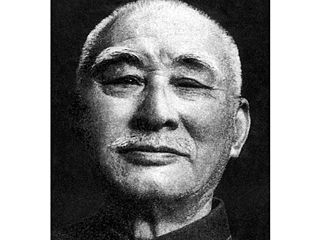 W
WYe Shengtao was a Chinese writer, journalist, educator, publisher and politician. He was a founder of the Association for Literary Studies (文學研究會), the first literature association during the May Fourth Movement in China. He served as the Vice-Minister of Culture of the People's Republic of China.
 W
WYu Bin Is a Chinese painter and writer. He now works as a Professor in Guangzhou University, teaching Drama and Film Literature, Drama and Film Appreciation and Criticism, and Screenplay Writing.
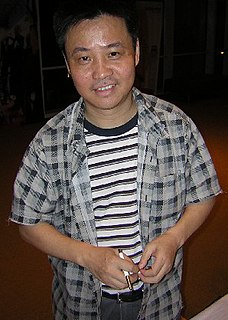 W
WYu Hua is a Chinese author, born April 3, 1960 in Hangzhou, Zhejiang province. Shortly after his debut as a fiction writer in 1983, Yu Hua was regarded as a promising avant-garde or post-New Wave writer. Many critics also regard him as a champion for Chinese meta-fictional or postmodernist writing. His novels To Live (1993) and Chronicle of a Blood Merchant (1995) were widely acclaimed. When he experimented with more chaotic themes like in Brothers (2005–06), Yu Hua received criticism from critics and readers.
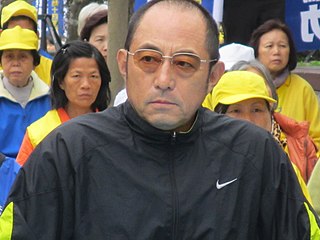 W
WYuan Hongbing is a Chinese Australian jurist, novelist, and Chinese dissident.
 W
WZhang Henshui was the pen name of Zhang Xinyuan (张心远), a popular and prolific Chinese novelist. He published more than 100 novels in his 50 years of fiction writing.
 W
WZuoxiao Zuzhou, real name Wu Hongjin, (吴红巾), is a Chinese musician and artist.